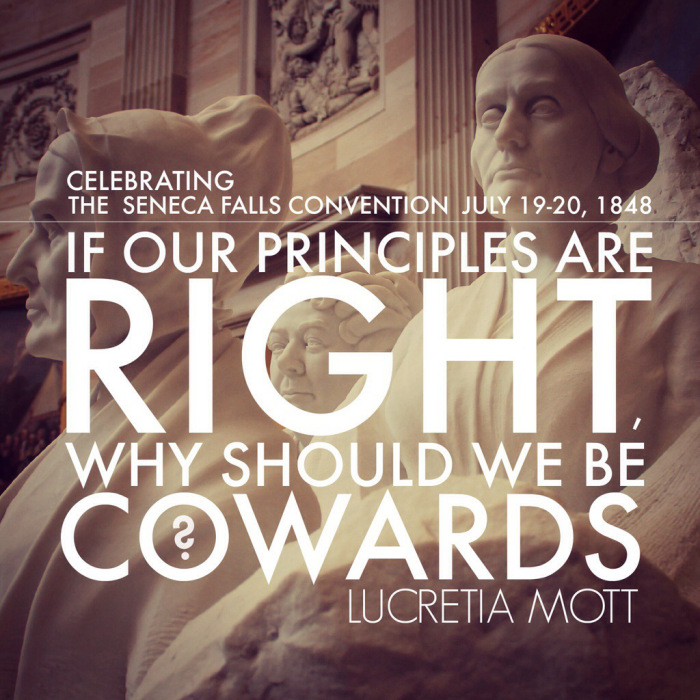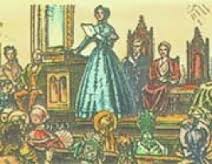1848 was a year of revolution in the Western world. Numerous European countries revolted against royalism and class oppression. The Communist Manifesto was published. Irish immigration to America skyrocketed as The Potato Famine ravaged the beautiful island. And Thaddeus Stevens, the outspoken, uncompromising abolitionist, was elected to Congress.
But nothing was a revolutionary as what took place on a hot, humid July weekend in a little Methodist church in upstate New York. Sixty eight women and thirty-two men dared to proclaim, “We hold these rights self-evident, that all men and women are created equal.”
In a Declaration of Sentiments modeled after the Declaration of Independence, these revolutionaries dared to defend a woman’s right to become an ordained minister and to get a higher education. Claiming that man has made woman, if married, “in the eye of the law, civilly dead,” they insisted on a married woman’s right to own property and keep her own salary. They even insisted on a divorced woman’s right to custody of her children. And after much acrimonious debate led by the brilliant Elizabeth Cady Stanton and supported by the great abolitionist, Frederick Douglass, they reluctantly agreed that women have a right to vote.
The Seneca Falls Conference was not the first women’s rights conference in the world, but there was a determination to make sure that this time, it would not be a flicker in the pan. As Elizabeth Cady Stanton wrote in the Declaration of Sentiments, “we shall use every instrumentality within our power to effect our object. We shall employ agents, circulate tracts, petition the state and national legislatures, and endeavor to enlist the pulpit and the press in our behalf. We hope this Convention will be followed by a series of conventions embracing every part of the country.”
In a culture that says it believes in women’s equality and respects the women and men who sacrificed so much so that we could claim our rights, you’d think that a commemoration of this watershed event in world history would be on the front page of all our newspapers and feminist blogs. But the truth is that on July 19 and 20 this year, we saw almost nothing. CNN said nothing about Seneca Falls. The New York Times said nothing. The Nation, a progressive journal, said nothing. Ms Magazine Online said nothing. The National Women’s History Museum never emailed a tribute to its subscribers. A Google search returned links about a celebration at National Women’s Rights Historical Park, a short tribute in Congress, an article in Feminist Majority Online and some blog posts. But that offering was paltry for such a major event and no, there wasn’t a Google doodle.
It’s tempting to ponder why the culture ignores Seneca Falls. It is also compelling to have one more discourse about women’s reluctance to “lean in”, even if they are feminists, and men’s disdain for the feminist movement. But instead of having another tiresome discussion, let’s take a cue from Elizabeth Cady Stanton, Lucretia Mott and the signers of the Declaration of Sentiments and do something.
The media is not going to respect Seneca Falls until we make them do it. And yes, we have to insist that all feminist organizations pay homage to the Seneca Falls conference every single year. It means that as individuals, we send emails, write tweets and that we write to proposals@google.com and request a Google Doodle on July 19 or 20, 2015 and every year thereafter.
When we fail to pay our respects to Seneca Falls, we are saying that we do not value the work that the activists did, even though we have no problem using the rights that they claimed for us. I can certainly understand why feminist zines must concentrate on the Hobby Lobby ruling, and why the mainstream media needs to focus on the MH17 crash and the Gaza-Israel conflict. But it takes very little to add a compelling article about Seneca Falls to a website. Besides, it can inspire us in our deepest moments of depair and it can provide hope that the oppressors of the world will not always have the last word.
Military veterans and civil rights activists learned long ago that the world would not remember their sacrifices until they made them do it. Holidays like Veterans Day and Martin Luther King Day and remembrances of the Normandy Invasion and the Selma to Montgomery March would have never happened without persistent activism. These lessons are twice as true for feminists.
Even though no shots were fired at Seneca Falls and only 100 people signed the Declaration of Sentiments, it is still the standout in a year of revolution. 166 years later, it still feels revolutionary – and refreshing – to say, “All men and women are created equal.” So please, never forget Seneca Falls 1848. And never let anyone else forget.
Kathleen Trigiani


